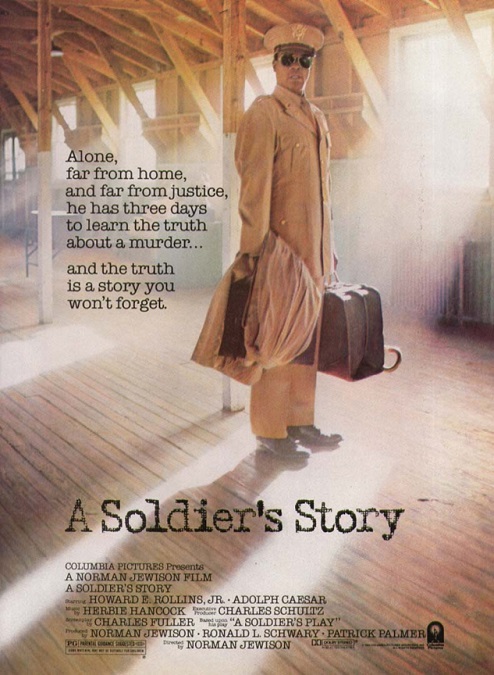
A Soldier’s Story – 1984
I have to say, I loved the structure of this film. It made sense and was incredibly well written. And the format that it used was so simple, and yet so effective. The movie is really a crime drama, and despite its 1940s setting, its emphasis on the difficult subject of racism, and its overtly ethnic nature, it was a detective story that smacked of film noir.
The movie starts out as Sergeant Waters, played by Adolph Caesar, drunk as a skunk and wobbling around the town in the dark, is beaten and eventually shot to death, murdered. But this is Louisiana in 1944. Nobody seems to care too much about the death of a black man, military or not. But somehow, the Judge Advocate General gets wind of it and sends Captain Richard Davenport, played by Howard E. Rollins Jr., to investigate. His presence is an inspiration to Sgt. Waters’ segregated platoon, and an offense to the white officers who command them. You see, apparently a black officer was such a deliberate rarity that it was a pretty big deal.
But Cpt. Davenport is all business. He is a smart and hard-working lawyer who is determined to get to the truth. But upon his arrival, he is strongly discouraged from taking the investigation seriously because if a black man were to arrest a white man, unstoppable chaos would ensue. But he is too much of a professional. Before he even visits his billet, he starts interviewing witnesses.
And here is where the wonderful writing and great story structure come into play. With each new soldier he interviews, we, the audience, get to see more of the back-story, what kind of a man Sgt. Waters was. We learn about his motives and his actions, but only a little bit at a time. And along with those revelations about his character, we learn about the black soldiers under his command, how they felt about him, and by the end, who really killed him, and why.
The film was put together like a gumshoe detective story. As we got to know the characters, we find that none of them liked Sgt. Waters. He was a strict and downright mean man, who was not above belittling his men to assert his rule over them. He was cruel and careless, heartless and hateful, easily giving nearly all of his black soldiers reasons for wanting him dead.
So who did it? Was it Pvt. Wilkie, played by Art Evans, a man who he treated like dirt and demoted without cause? Was it Pvt. Cobb, played by David Allen Grier, whose best friend had been willfully driven to suicide by Sgt. Waters for being an uneducated Geechee? Was it Pvt. Peterson, played by Denzel Washington, whom Waters had berated and goaded into a fist fight? Or was it the two white officers, Capt. Wilcox and Lt. Byrd, who had been seen confronting Waters on the night of his murder?
The mystery alone was enough to keep my interest, but it was the well-painted portrait of racism and the terrible practice of segregation that was prevalent at the time that really made the movie memorable. Not only did the film examine the way black and white soldiers interacted with each other, each keeping to their own groups whenever possible, but also the way the black men interacted with one another. And it was those things that I found interesting.
The entire cast did a fine job, but as much as I hate to say it, the stand out actor was Adolph Caesar. I say I hate to admit it because his character was such a mean jerk, especially in the way he treated Pvt. Cobb’s friend, C.J. Memphis, played by Larry Riley. He was just a poor, uneducated young man who never meant any harm to anybody. But Sgt. Waters despised him because he was too simple minded to fight against being a complacent tool of the white men. When they called him names, he laughed it off. When they belittled him for being black, he bore it without an ounce of anger in his heart. And for that, Sgt. Waters framed him for murder, locked him in a cell, and demeaned him until he hung himself. That’s what you call good writing, my friends.

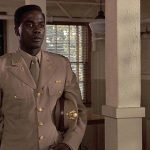
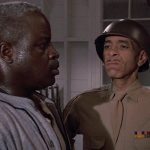
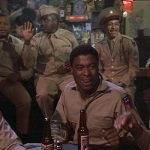
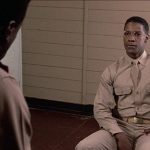
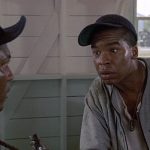
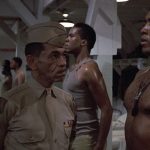

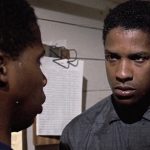
Loved it! I started watching it on late night tv with zero expectations and became enmeshed in the subtle drama and mystery and
my personal horror regarding that part of history. My partner
has seen it multiple times and still finds it fascinating